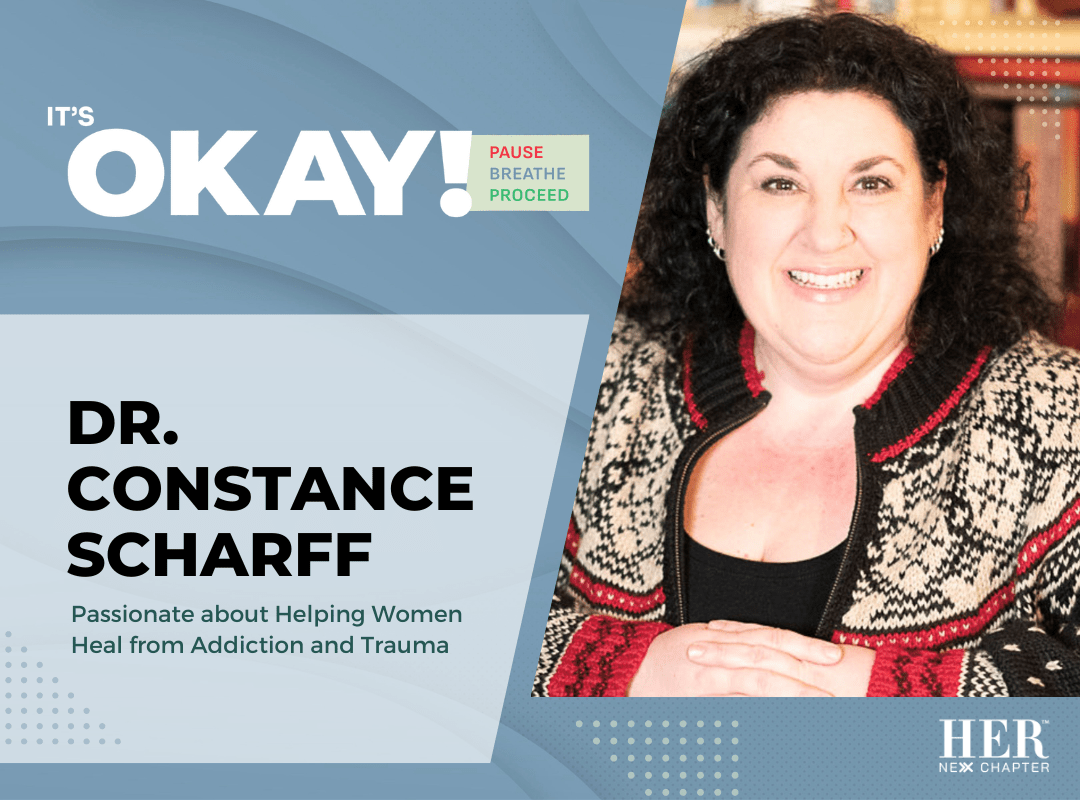Self-care and good mental health should always be a priority. There may be instances when we are so overwhelmed with emotions or immersed in our reaction to an incident that we question ourselves. Is it normal for me to feel this now? Are these emotions severe or long-lasting enough that I should seek professional help? Is how I am feeling having a negative impact on my life? Understanding the factors affecting our emotions and mental state is the first step in our healing journey.
Meeting with Dr. Constance Scharff was an experience filled with new perspectives and eye-opening insights into the societal issues we face today, especially mental health issues. A best-selling author, riveting speaker, and addiction and trauma researcher who studies complementary mental health practices, Dr. Scharff has a Ph.D. in Transformative Studies, specializing in radically transformative personal experiences. Also known by her Hebrew name “Ahuva,” she is passionate about helping people heal from addiction and trauma so that each of us can live lives of meaning and purpose.
With more people talking about mental health, I was curious to understand if there is a connection between mental health and pandemic-induced lockdown. Our conversation started with discussing the real and perhaps sometimes hyped-up impact of the pandemic to the stress and trauma people face.
Dr. Scharff said the pandemic is considered by the public to be over and so is the most challenging damage caused by it. Covid-19 has moved to being endemic, an ongoing part of our lives. It has exacerbated a huge divide between people who trust in the expertise of scientists, physicians, and mental health professionals and those who don’t. Today, few people wear masks as a general precaution when in public places. The reality is that there are still people dying of Covid-19 every day.
She added that mental health issues, trauma, and addiction have increased in the past couple of years, but the pandemic cannot be solely blamed for this. The lockdown has caused more setbacks in our lives than we could have imagined. Nearly everyone has missed something important, something planned or gone through traumatic events. Yet there are other important issues in play.
Dr. Scharff pointed out the correlation between Covid-19 and mental health, especially among children who have been isolated at home, with impact on brain development and social skills that the children learn from the community. She also highlighted other social issues that cause a significant amount of stress to people, such as gun violence, little action to reverse the opioid overdose problem, and the rollback of what many consider human rights for women, LGBTQ individuals, and others. When you add greater divisiveness to an already stressed and divided nation, mental health issues are bound to worsen.
These are issues that affect our mental health, specifically weighing on women. “How do we address our mental health when we identify a concern?” Dr. Scharff asks. “You have to add to the problem the stress related to care that is either not covered by insurance or we do not have access to. In that situation, the problems can seem intractable,” Dr. Scharff says, “There is no mental health safety net in the USA. It is critical to deal with these systemic issues if we hope to experience greater well-being. How do we mend the divides to have a meaningful discourse about the real and immediate problems that face us?”
Dr. Scharff places some of her hope on Gen Z to bring about much-needed change in society. “These children and young adults are among the most spectacular human beings on the planet,” she says. “They have understood that the system is rigged, and it will never support them in having meaningful, connected lives. It is imperative that we include their voices to solve time-sensitive problems like climate change. Whether or not they will be more widely included and what their impact will be remains to be seen.”
Complementary therapies, such as music or other art forms, to treat mental health issues cost little to no money and can be widely used to help people improve their overall mental health and well-being. While very useful, Dr. Scharff cautions that there are limitations to the effectiveness of these therapies. For example, someone who has had a bad day at work will feel better if they take some time to sing, but the therapy would be less effective with someone who has recently suffered the loss of a child. Dr. Scharff’s emphasis is overall community mental health, supporting people to learn skills to help them feel more connected and supported so that everyday harms don’t cause severe mental health issues.
In her role as an addiction and trauma researcher, she brings the latest in evidence-based, complementary addiction and trauma treatment information worldwide to those who suffer. While awareness of mental health concerns has increased, there has also been a rise in what Dr. Scharff considers “over-pathologizing” emotional experiences and mental health in this country. Her job too, she says, is to normalize reasonable emotional experiences. “If you recently lost a loved one,” Dr. Scharff says, “It’s reasonable that you will feel sad, maybe even experience some short-term depression. That’s the experience of grief. Rather than tell you that you’re mentally ill, I believe that the first line of treatment is support and connection. What can we do to help someone with this type of loss experience and move through the grief, instead of labeling them as sick and putting them into a clinical, costly, disconnected, and often broken professional system?”
“To improve our mental health,” Dr. Scharff concludes, “We need to address both the systemic social issues that plague us and at the same time develop skills to help us in the day-to-day improvement of our well-being. The most important thing you can do today to change how you feel is to reach out to another in a way that gives you the experience of genuine connection. We decline in isolation. We thrive with support in community.”
Dr. Scharff is a guest speaker for our It’s OKAY! Pause, Breathe, Proceed mental wellness event streaming on Thursday, May 25. Join us to hear what she and other eminent speakers have to say about mental health issues and tackling them.
The Future of Connection for Women








0 Comments